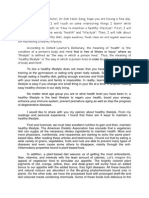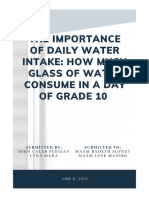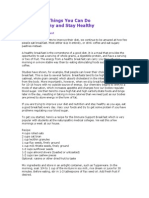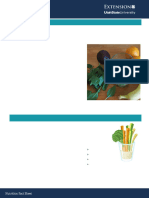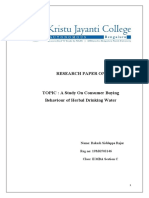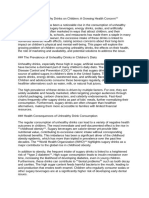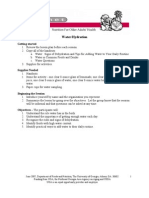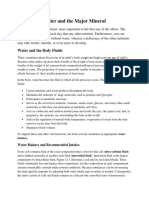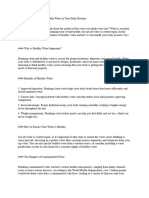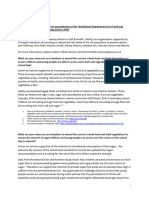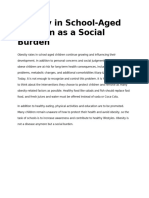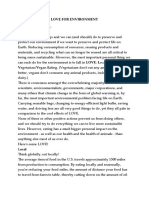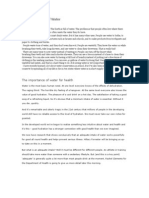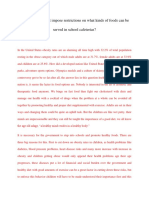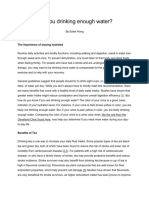Together We Can!: Why Is Drinking Water Important To Our Health?
Together We Can!: Why Is Drinking Water Important To Our Health?
Uploaded by
Chad LeoCopyright:
Available Formats
Together We Can!: Why Is Drinking Water Important To Our Health?
Together We Can!: Why Is Drinking Water Important To Our Health?
Uploaded by
Chad LeoOriginal Description:
Original Title
Copyright
Available Formats
Share this document
Did you find this document useful?
Is this content inappropriate?
Copyright:
Available Formats
Together We Can!: Why Is Drinking Water Important To Our Health?
Together We Can!: Why Is Drinking Water Important To Our Health?
Uploaded by
Chad LeoCopyright:
Available Formats
Together we can!
Obesity is one of the worlds leading problems in youth health. It is
scientifically proven that one of the main causes of childhood obesity is
the amount of sugary drinks that our kids consume. As a student I know
how hard it is to make the healthy choice, but we should not be making
it even harder by having a tax on bottled water. Water is essential to life,
no matter what form.
Tap water is by far the cheapest, safest, and most accessible alternative
to sugary drinks that hurt our health. For many families, though, bottled
water is their main source of drinking water. In all its forms, whether
from the tap, the fountain, or a bottle, water should be highly accessible,
affordable, and tax-free.
Maryland is one of only four states that taxes bottled water at a higher rate than other essential
groceries, such as milk and bread. Our tax code should not discourage water consumption. It is essential
to life.
Why is drinking water important to our health?
At birth, babies are made up of 75% water. By the time we die, most adults are only 50% water. Water is
important to the proper functioning of our bodies and every organ system within (The Universe Within:
the Deep History of the Human Body, 2013). Water is the only liquid nutrient that is essential for your
bodys hydration. All cells and organs need water to function in the human body (CDC, 2011). The
Institute of Medicine recommends that an adequate intake of water for men is roughly about 15 cups of
total beverages a day, and about 11 cups for women. Lack of water can lead to dehydration, decreased
energy levels, poor physical coordination, and impaired mental performance (United States Department
of Agriculture, 2014). Water is a healthier alternative to sugary drinks. The Institute of Medicine
attributes 20% of the nations weight increase between 1977 and 2007 to consumption of sugary
drinks, including regular soda, sugar-added juices, flavored waters and teas, sports drinks, and energy
drinks (Institute of Medicine, 2012). Drinking just one 8-oz sugary drink per day increases a childs
odds of becoming obese by 60% (Rudd Center for Food Policy and Obesity, 2012). Sugary drinks
contribute more calories and added sugars to our diets than any other food or beverage and daily
consumption is strongly linked to higher childhood obesity and type 2 diabetes rates (Institute of
Medicine, 2012).
The health choice NEEDS to be the affordable choice!
In addition to hydrating the body, water also flushes toxins out of vital organs, carries nutrients to your
cells, protects body organs and tissues, helps prevent constipation, lubricates joints, regulates body
temperature and provides a moist environment for ear, nose, and throat tissues (CDC, 2012). Studies in
healthy adults show that even mild dehydration impairs a number of important aspects of cognitive
function such as concentration, alertness, and short-term memory (Nutrition Reviews, 2005).
Studies prove that this change needs to happen
Only 72% of high school students nationwide drank a serving of water daily (Morbidity and Mortality
Weekly Report, 2010). Sugary drink intake is associated with long-term change in body fat in children,
and replacing sugary drinks with water or milk is inversely associated with body fat development
(Nutrition Journal, 2014). Replacing all sugary drinks with drinking water was associated with a
predicted mean decrease in total energy of 200 calories/day over 12 months. The results suggest that
replacing sugary drinks with drinking water can help lower total calories in overweight consumers
(Obesity, 2007). A prospective study of 82,900 women (Nurses Health Study II) estimated that the
replacement of one serving of sugary drinks and fruit juices per day by one cup of plain water per day
was associated with a 7% (modest) lower risk of type 2 diabetes (American Journal of Clinical Nutrition,
2007). A study of Lower Mississippi Delta adults concluded that replacing sugary drinks with water could
substantially improve the diet quality of the population and potentially lead to significant weight loss
over time. Prioritizing intervention efforts to focus on the replacement of sugary drinks with water may
be the most efficacious approach for conveying potentially substantial health benefits in this and similar
disadvantaged populations (Food Nutrition Review, 2011). Water consumed before a meal has been
found to reduce caloric intake among non-obese older adults. In a small study of overweight and obese
older adults, meal caloric intake was significantly less (by 13%) when subjects had water before the
meal, compared to when they had no water prior to the meal (Journal of the Academy of Nutrition and
Dietetics, 2008).
Points we need to make clear!
The Water Affordability Act helps ensure that healthy beverage choices are widely
available, accessible, and affordable.
By wide margins, Marylanders support this smart, effective and evidenced-based policy
to push back against the increasing rates of childhood obesity and teenage diabetes.
Drinking water is essential to life. In all its forms, whether from the tap, the fountain, or a
bottle, water should be highly accessible, affordable, and tax-free.
Tap water is by far the cheapest, safest, and most accessible alternative to the sugary
drinks that harm our children. But for many families, bottled water is their main source of
drinking water. Our tax code should not discourage water consumption.
A solid body of evidence points to sugary drinks as the prime culprit in diseases such as
childhood obesity and teen diabetes, both of which are on the rise. It is important that
drinking water, the healthiest alternative, also be the most accessible and affordable
choice.
As our poll results indicate, the public strongly supports removing the sales tax on
bottled water. Nearly 80% of Marylanders believe that drinking water should be tax-free.
By wide margins, Marylanders support this smart, effective and evidenced-based policy
to push back against the increasing rates of childhood obesity and teenage diabetes.
We need you!
Weve given you reasoning, weve given you facts, and god has given you common sense. Sign this
petition to push our legislators to remove the 6% sales tax off of bottled water, and help end
childhood obesity today!
We are Sugar Free Kids Maryland, you are you, and together we will make a great team to end the
epidemic!
You might also like
- The Ashley Book of KnotsDocument638 pagesThe Ashley Book of KnotsOskar Ariza96% (25)
- Eng Plus GR 5 Term 3 LP SalikhaDocument37 pagesEng Plus GR 5 Term 3 LP SalikhaAdina ParkNo ratings yet
- The Juice Lady's Remedies for Diabetes: Juices, Smoothies, and Living Foods Recipes for Your Ultimate HealthFrom EverandThe Juice Lady's Remedies for Diabetes: Juices, Smoothies, and Living Foods Recipes for Your Ultimate HealthNo ratings yet
- M. Sc. I Maths MT 202 General Topology All PDFDocument260 pagesM. Sc. I Maths MT 202 General Topology All PDFPushpa. k krishna reddy67% (3)
- fcs400 FinalcdpaperDocument8 pagesfcs400 Finalcdpaperapi-282741728No ratings yet
- Infused Water: Quick & Easy Vitamin Water Recipes for Weight Loss, Detox & Fast Metabolism (2nd Edition)From EverandInfused Water: Quick & Easy Vitamin Water Recipes for Weight Loss, Detox & Fast Metabolism (2nd Edition)No ratings yet
- How Does Hydration Education Change One's Misconception of Hydration and Its Effects On Our Body?Document23 pagesHow Does Hydration Education Change One's Misconception of Hydration and Its Effects On Our Body?api-310111771No ratings yet
- ObeseDocument5 pagesObeseteresalopNo ratings yet
- Healthy Drinks - The Nutrition Source - Harvard T.H. Chan School of Public HealthDocument3 pagesHealthy Drinks - The Nutrition Source - Harvard T.H. Chan School of Public HealthTomita SebeNo ratings yet
- RD Enlgish Term PaperDocument12 pagesRD Enlgish Term Paperapi-249000249No ratings yet
- Water Infusions: Refreshing, Detoxifying and Healthy Recipes for Your Home InfuserFrom EverandWater Infusions: Refreshing, Detoxifying and Healthy Recipes for Your Home InfuserNo ratings yet
- Sugary Beverages Represent A Threat To Global HealthDocument3 pagesSugary Beverages Represent A Threat To Global HealthINSTITUTO ALANANo ratings yet
- WPR 2016 DNH 008 EngDocument16 pagesWPR 2016 DNH 008 Engalfian raizhalNo ratings yet
- Ample Sunshine, Fresh Clean Air and Regular Exercise For Maintaining A Healthy LifestyleDocument4 pagesAmple Sunshine, Fresh Clean Air and Regular Exercise For Maintaining A Healthy LifestylemeeleanNo ratings yet
- Sugar Drink Consumption Fact SheetDocument3 pagesSugar Drink Consumption Fact SheetMarcosNo ratings yet
- Water - The Nutrition Source - Harvard T.H. Chan School of Public HealthDocument8 pagesWater - The Nutrition Source - Harvard T.H. Chan School of Public HealthLee JenniferNo ratings yet
- Grade 10 Research 2Document4 pagesGrade 10 Research 2Jystreem KazutoNo ratings yet
- Importance of Healthy WaterDocument2 pagesImportance of Healthy WaterMinoska Lizanne GomesNo ratings yet
- Persuasive Speech Outline and Video Link SubmissionDocument5 pagesPersuasive Speech Outline and Video Link SubmissiontishajNo ratings yet
- Nutrition Final Research PaperDocument7 pagesNutrition Final Research PaperMatthew PalagyiNo ratings yet
- Water and Your Health: Clean Water Is Vital to Your HealthFrom EverandWater and Your Health: Clean Water Is Vital to Your HealthNo ratings yet
- SanjayDocument18 pagesSanjayNaren KarthikNo ratings yet
- Today S Dietitian March 2014Document68 pagesToday S Dietitian March 2014Quang Văn VũNo ratings yet
- WWTPDocument12 pagesWWTPrasheethriyaz785713No ratings yet
- Ten Simple Things You Can Do (HEALTH)Document11 pagesTen Simple Things You Can Do (HEALTH)Angie Ngu100% (1)
- Smoothies - Helpful or Harmful_Document4 pagesSmoothies - Helpful or Harmful_ikhtiar tawakkalNo ratings yet
- Edited Sugary Drinks and Child ObesityDocument4 pagesEdited Sugary Drinks and Child ObesityChristopher Rodriguez PerezNo ratings yet
- Early Childhood Drinking Water Toolkit Final 508reducedDocument50 pagesEarly Childhood Drinking Water Toolkit Final 508reducedSintos Carlos MiguelNo ratings yet
- Research Paper Report - 19MG503146Document13 pagesResearch Paper Report - 19MG503146Rakesh RajurNo ratings yet
- MaazaDocument3 pagesMaazaArpit NigamNo ratings yet
- FSchapter 1Document7 pagesFSchapter 1Danna Mae R. MagapanNo ratings yet
- The Impact of Unhealthy Drinks On Children: A Growing Health ConcernDocument3 pagesThe Impact of Unhealthy Drinks On Children: A Growing Health ConcernbihafepuheboNo ratings yet
- Top 5 Health Benefits of Drinking WaterDocument3 pagesTop 5 Health Benefits of Drinking WaterLuise MauieNo ratings yet
- Healing HabitsDocument29 pagesHealing HabitsdjoleNo ratings yet
- Drink and WaterDocument4 pagesDrink and WaterAbu BakarNo ratings yet
- Foods in Fridge NewDocument15 pagesFoods in Fridge Newtopcat7No ratings yet
- Hardy Et Al-2018-Australian and New Zealand Journal of Public HealthDocument5 pagesHardy Et Al-2018-Australian and New Zealand Journal of Public HealthAnggita RifkyNo ratings yet
- Water/Hydration: Getting StartedDocument10 pagesWater/Hydration: Getting Startedfrowee23No ratings yet
- Fall 2013 SECA ReporterDocument13 pagesFall 2013 SECA ReporterrecavaNo ratings yet
- Water and The Major MineralDocument7 pagesWater and The Major MineralRohmah Nur HusnahNo ratings yet
- Water and Beverage Consumption Among Adults in The United States: Cross-Sectional Study Using Data From NHANES 2005-2010Document10 pagesWater and Beverage Consumption Among Adults in The United States: Cross-Sectional Study Using Data From NHANES 2005-2010Nguyen Minh TrongNo ratings yet
- NCP About Fluid IntakeDocument5 pagesNCP About Fluid IntakeWild Rose100% (1)
- DehydrationDocument2 pagesDehydrationlavoisierjane8No ratings yet
- The Importance of Healthy Water in Your Daily RoutineDocument2 pagesThe Importance of Healthy Water in Your Daily Routinenorman.primaryNo ratings yet
- Reading Advanced TestDocument6 pagesReading Advanced TestWilson GulumbaNo ratings yet
- fsn310 - Research PaperDocument8 pagesfsn310 - Research Paperapi-300301211No ratings yet
- Asignment 2Document2 pagesAsignment 2Agung EkaNo ratings yet
- Water and Beverage Consumption Among Adults in The United States: Cross-Sectional Study Using Data From NHANES 2005 - 2010Document9 pagesWater and Beverage Consumption Among Adults in The United States: Cross-Sectional Study Using Data From NHANES 2005 - 2010Pau StraitNo ratings yet
- Sweet Stuff - NIH News in Health PDFDocument4 pagesSweet Stuff - NIH News in Health PDFAlonso RedNo ratings yet
- Action On Salt ResponseDocument2 pagesAction On Salt Responsetijak88617No ratings yet
- Lifestraw Information, Technical Data & SpecificationsDocument32 pagesLifestraw Information, Technical Data & SpecificationsTotal PrepperNo ratings yet
- Obesity in SchoolDocument1 pageObesity in SchoolclementinewinterdhavanNo ratings yet
- Healthy Drinks Healthy Kids Provider-Toolkit-9.22Document9 pagesHealthy Drinks Healthy Kids Provider-Toolkit-9.22Maaduri AmudhaNo ratings yet
- Persuasive SpeechDocument3 pagesPersuasive SpeechAlbert ChewNo ratings yet
- DocumentDocument2 pagesDocumentMeer KhanNo ratings yet
- Love For EnvironmentDocument9 pagesLove For EnvironmentRonak KapadiaNo ratings yet
- The Problem of Obesity in AmericaDocument3 pagesThe Problem of Obesity in AmericaYagmur BalciNo ratings yet
- Essay On Soda DrinksDocument1 pageEssay On Soda DrinksAli Khan100% (1)
- The Importance of WaterDocument6 pagesThe Importance of WaterandyNo ratings yet
- Should Government Impose Restrictions On What Kinds of Foods Can Be Served in School CafeteriasDocument9 pagesShould Government Impose Restrictions On What Kinds of Foods Can Be Served in School CafeteriasharonNo ratings yet
- BLOG19Document3 pagesBLOG19Abdulganeey Horlarmilekan MuheezNo ratings yet
- True Vitality Test by Blue ZonesDocument3 pagesTrue Vitality Test by Blue ZonesRodrigo GarciaNo ratings yet
- 12 Health Benefits of Drink..Document2 pages12 Health Benefits of Drink..ramudu oneNo ratings yet
- Dark Enlightenment - The Neo-Fascist Philosophy That Underpins Both The Alt-Right and Silicon Valley Technophiles - Quartz PDFDocument6 pagesDark Enlightenment - The Neo-Fascist Philosophy That Underpins Both The Alt-Right and Silicon Valley Technophiles - Quartz PDFJustin Gortva Scheibel0% (1)
- Macro EnvironmentDocument4 pagesMacro EnvironmentLinhThùyNo ratings yet
- Ulli Bögershausen - in A Constant State of FluxDocument7 pagesUlli Bögershausen - in A Constant State of FluxPepeNo ratings yet
- Lesson Plan: Unit 9: PLACES Lesson 1 I. ObjectivesDocument2 pagesLesson Plan: Unit 9: PLACES Lesson 1 I. ObjectivesHiền PhanNo ratings yet
- Pharmacy Ethics and ProfessionalismDocument2 pagesPharmacy Ethics and ProfessionalismInternational Journal of Innovative Science and Research TechnologyNo ratings yet
- JVC Car Stereo ManualDocument51 pagesJVC Car Stereo ManualErvin TanigNo ratings yet
- Intel Case StudyDocument48 pagesIntel Case StudypradeepNo ratings yet
- Facility-Perez M.Document2 pagesFacility-Perez M.Marnelli Perez100% (1)
- Term Paper - Computer ArchitectureDocument2 pagesTerm Paper - Computer ArchitectureAttlee GamundaniNo ratings yet
- Puregold Minimart Requirements For StudentsDocument13 pagesPuregold Minimart Requirements For StudentsRhynelle TolentinoNo ratings yet
- (최상위) 7.Technology in Our Lives (03) - 동아 (윤정미) 중3 영어 (15문제) (Q) - unlockedDocument8 pages(최상위) 7.Technology in Our Lives (03) - 동아 (윤정미) 중3 영어 (15문제) (Q) - unlockedjihagi8No ratings yet
- Noble and Murat - The London Gazette, September 17, 1897Document1 pageNoble and Murat - The London Gazette, September 17, 1897macedo.sampaio4274No ratings yet
- Effect of Impurities On Cast Iron Impurities:: SiliconDocument16 pagesEffect of Impurities On Cast Iron Impurities:: SiliconMD. ZUBAIR ISLAMNo ratings yet
- Taylor Introms12 PPT 10Document38 pagesTaylor Introms12 PPT 10ikoy24No ratings yet
- Fire Services System Training MaterialDocument46 pagesFire Services System Training Materialmark pangNo ratings yet
- Question 1: Read The Following Case and Attempt The Questions BelowDocument4 pagesQuestion 1: Read The Following Case and Attempt The Questions BelowShubham Aggarwal0% (1)
- L.D.college of Engineering, Ahmedabad 028.20210224Document17 pagesL.D.college of Engineering, Ahmedabad 028.20210224Neel GhoriNo ratings yet
- Tamer AL Shikh Khalil Curriculum Vitae1-3Document2 pagesTamer AL Shikh Khalil Curriculum Vitae1-3aboalshamkhalilNo ratings yet
- Iphone 5 SchematicDocument53 pagesIphone 5 Schematicchufta100% (4)
- Research Paper On SIX SIGMADocument11 pagesResearch Paper On SIX SIGMAsahilgarg12880% (1)
- DR Gary SchwarzDocument6 pagesDR Gary Schwarzdanahlh100% (1)
- Unit 1: Introduction To Communication Systems Historical Notes-Communication SystemsDocument55 pagesUnit 1: Introduction To Communication Systems Historical Notes-Communication Systemsbad is good tatyaNo ratings yet
- FX Mechanical Leak Detectors: Quick Troubleshooting GuideDocument3 pagesFX Mechanical Leak Detectors: Quick Troubleshooting GuideJose Manuel CastañedaNo ratings yet
- Template Most and Least Learned SkillDocument2 pagesTemplate Most and Least Learned SkillLily Rosemary100% (1)
- Chapter 1: Professional Nursing Practice: Professor Andrew Tran, MSN, RN, PHN, CENDocument30 pagesChapter 1: Professional Nursing Practice: Professor Andrew Tran, MSN, RN, PHN, CENJessie PumpkinNo ratings yet
- Politics of (In) Accessibilities, Citizens With Disabilities and Their AlliesDocument7 pagesPolitics of (In) Accessibilities, Citizens With Disabilities and Their AlliesNie Zofia NierodzińskaNo ratings yet
- House DimirDocument17 pagesHouse Dimirkriss theory100% (1)













